

Unless we want another Mt Popocatepetl to erupt, we want to avoid such a catastrophe.
Stress can affect us in many ways. Both physically and mentally. From depression to diabetes to obesity. But not all stress are bad, there is good stress that can motivate you to do your work and task, efficiently in which induces flight or fight response and starts flooding the body with chemicals like epinephrine, norepinephrine, and cortisol
Managing Stress and or burnout is just as important as any day to day activities or routine we take part in. Many benefits can come from simply, taking of yourself.
Healthy ways to handle life’s stressors. Ozbay, F., Johnson, D.
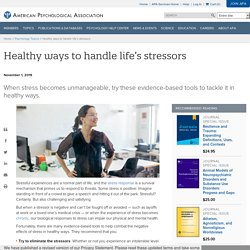
C., Dimoulas, E., Morgan, C. A., Charney, D., & Southwick, S. (2007). Social support and resilience to stress: from neurobiology to clinical practice Psychiatry (Edgmont (Pa.: Township)), 4(5), 35–40. Nelson, S. Aging and Stress. By Chris Woolston, M.S.

At any age, stress is a part of life. Young and old alike have to face difficult situations and overcome obstacles. While young adults struggle to establish a career, achieve financial security, or juggle work and family demands, older people may face failing health or dwindling finances -- or simply the challenges of retaining their independence. Unfortunately, the body's natural defenses against stress gradually break down with age. But you don't have to give in to stress just because you're no longer young. Many seniors still manage to sail through their later years. Long Term Effects of Stress: Effects of Stress On the Body. Share on: Stress doesn't just make us feel bad emotionally.

It can make us physically sick. Everyone feels stressed from time to time. Stress is how the brain and body respond to any demand. Any type of challenge—such as presentation at work, a significant life change or a traumatic event—can be stressful. In fact, a recent survey of over 3,000 women conducted by HealthyWomen, Prevention magazine and health care communications agency GCI Health, discovered that 40 percent of women experience stress constantly—multiple times a day. READ more about the survey results. How stress affects your health. Stress: We've all felt it.
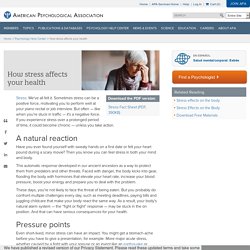
Sometimes stress can be a positive force, motivating you to perform well at your piano recital or job interview. But often — like when you're stuck in traffic — it's a negative force. What is burnout, and how can you cope with it? In a world where it seems as though the pressure to perform is always on, more and more people are admitting to burnout at work.
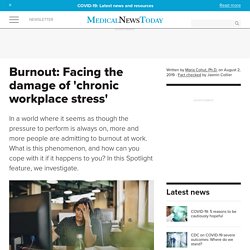
What is this phenomenon, and how can you cope with it if it happens to you? In this Spotlight feature, we investigate. In May 2019, the World Health Organization (WHO) formally recognized burnout as an “occupational phenomenon.” Their decision came after years of hearing people talk about it, trying understand why it affected them, and attempting to identify what they could have done to cope with it. Recently, a Gallup study of around 7,500 full time workers found that 23% were often in “burnout mode.” Although the WHO do not yet recognize burnout as a medical condition, some researchers call it “an occupational disease.” Stress at the workplace. What Causes Teen Stress? Stress: Definition and Impact on Overall Health - Video & Lesson Transcript. Stress, distress, eustress: just thinking about those terms may make you stress out!
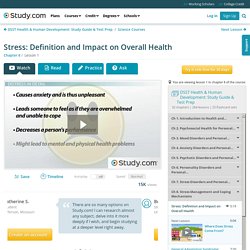
Don't worry, this lesson will define them and show plenty of examples of them in a manner that will calm your mind! Types of Stress At the end of this lesson, you'll be taking a quiz about the things we're about to go over. That quiz is almost certainly going to cause you a little bit of stress. Hopefully, only a little bit. How Stress and Control Issues Affect Health and Chronic Conditions - Video & Lesson Transcript. In this lesson, we'll look at how the idea of control, or the illusion of control, leads a person to stress.
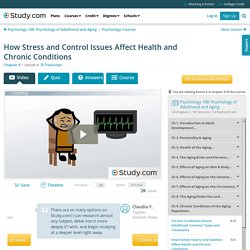
This stress, in turn, magnifies many chronic ailments. Chronic Conditions Barring some major issue, you will probably live into your 60s or 70s. Maybe even your 80s! Workplace Stress - The American Institute of Stress. Although the Institute is often asked to construct lists of the “most” and “least” stressful occupations, such rankings have little importance for several reasons.
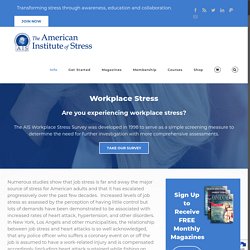
It is not the job but the person-environment fit that matters. Some individuals thrive in the time urgent pressure cooker of life in the fast lane, having to perform several duties at the same time and a list of things to do that would overwhelm most of us — provided they perceive that they are in control. They would be severely stressed by dull, dead-end assembly line work enjoyed by others who shun responsibility and simply want to perform a task that is well within their capabilities.
The stresses that a policeman or high school teacher working in an inner city environment are subjected to are quite different than those experienced by their counterparts in rural Iowa. Stress is a highly personalized phenomenon and can vary widely even in identical situations for different reasons. Teenage Stress. Teens are under more stress today than ever before.
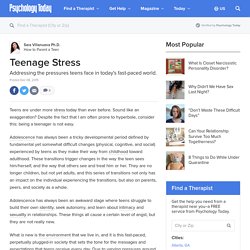
Sound like an exaggeration? Despite the fact that I am often prone to hyperbole, consider this: being a teenager is not easy. Adolescence has always been a tricky developmental period defined by fundamental yet somewhat difficult changes (physical, cognitive, and social) experienced by teens as they make their way from childhood toward adulthood. These transitions trigger changes in the way the teen sees him/herself, and the way that others see and treat him or her. How to recover from burnout and chronic work stress, according to a psychologist.
It’s pretty likely you’ve heard of burnout – and you may have even experienced it.
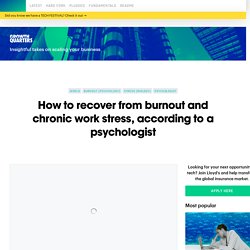
Caused by chronic work stress, it’s characterized by signs such as emotional exhaustion, lack of energy, and loss of satisfaction with work – and has been linked to a wide range of physical conditions such as cardiovascular diseases and musculoskeletal pain. Work stress activates our hormonal, metabolic, immune and cardiovascular systems. If these bodily responses are triggered too frequently, or for too long, they fail to return to normal and may alter our body’s immune and inflammation responses. These changes may eventually cause other physical conditions – such as coronary heart disease. Although an overhaul of work conditions and culture is needed to address the rise in people experiencing burnout, there are still many things we can do ourselves to deal with it now.
Burnout is a consequence of chronic work stress over extended periods of time. Types of recovery Daily recovery is also important. Understanding Stress: Eustress, Distress & Coping Strategies - Video & Lesson Transcript. Most people have to deal with stress on a regular basis. But do you know what it's really doing to your body? Learn more about the reasons behind feeling stressed as well as common strategies to not let the stress get to you. Effects of Stress. What Is Stress?